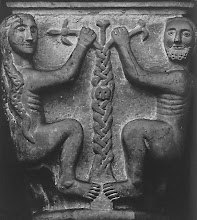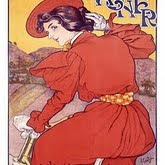The Astronomical Poems beg for attention, beginning as one feels one must with selections from Milton's Paradise Lost. But Milton is Milton - grand, sublime, oblique, ponderous. I have been a long time coming to read him with anything but irritation. His heavy self-righteousness - just in the fall of his lines. His uncharitable irritability. The blind father of modern poetry in the English tongue.
And so before, or maybe instead of, beginning with Father Milton, I will give space for the prose-poetry of Charlotte Bronte from her novel Shirley, BOOK II, chapter vii, entitled "WHICH THE GENTEEL READER IS RECOMMENDED TO SKIP, LOW PERSONS BEING HERE INTRODUCED:
And so before, or maybe instead of, beginning with Father Milton, I will give space for the prose-poetry of Charlotte Bronte from her novel Shirley, BOOK II, chapter vii, entitled "WHICH THE GENTEEL READER IS RECOMMENDED TO SKIP, LOW PERSONS BEING HERE INTRODUCED:
" . . . The gray church and grayer tombs look divine with this crimson gleam on them. Nature is now at her evening prayers: she is kneeling before those red hills. I see her prostrate on the great steps of her altar, praying for a fair night for mariners at sea, for travellers in deserts, for lambs on moors, and unfledged birds in woods. Caroline, I see her! and I will tell you what she is like: she is like what Eve was when she and Adam stood alone on earth."
"And that is not Milton's Eve, Shirley."
"Milton's Eve! Milton's Eve! I repeat. No, by the pure Mother of God, she is not! Cary, we are alone: we may spake what we think. Milton was great; but was he good? His brain was right; how was his heart? He saw Heaven: he looked down on Hell. He saw Satan, and Sin his daughter, and Death their horrible offspring. Angels serried before him their battalions: the long lines of adamantine shields flashed back on his blind eyeballs the unutterable splendor of heaven. Devils gathered their legions in his sight: their dim, discrowned, and tarnished armies passed rank and file before him. Milton tried to see the first woman: but, Cary, he saw her not."
"You are bold to say so, Shirley."
"Not more bold than faithful. It was his cook that he saw: or it was Mrs. Gill, as I have seen her, making custards, in the heat of summer, in the cool dairy, with rose-trees and nasturtiums about the latticed window, preparing a cold collation for the Rectors, - preserves, and 'dulcet creams' puzzled 'what choice to choose for delicacy best; what order so contrived as not to mix tastes, not well-joined, inelegant; but bring taste after taste, upheld with kindliest change.'"
"All very well too, Shirley."
"I would beg to remind him that the first men of the earth were Titans, and that Eve was their mother: from her sprang Saturn, Hyperion, Oceanus; she bore Prometheus ---"
"Pagan that you are! what does that signify?"
"I say, there were giants on the earth in those days: giants that strove to scale heaven. The first woman's breast that heaved with life on this world yielded the daring which could contend with Omnipotence: the strength which could bear a thousand years of bondage, - the vitality which could feed that vulture death through uncounted ages, - the unexhausted life and uncorrupted excellence, sisters to immortality, which, after millenniums of crimes, struggles, and woes, could conceive and bring forth a Messiah. The first woman was heaven-born: vast was the heart whence gushed the well-spring of the blood of nations; and grand the undegenerate head where rested the consort-crown of creation."
"She coveted an apple, and was cheated by a snake: but you have got such a hash of Scripture and mythology into your head that there is no making any sense of you. You have not yet told me what you saw kneeling on those hills."
"I saw - I now see - a woman-Titan: her robe of blue air spreads to the outskirts of the heath, where yonder flock is grazing; a veil white as an avalanche sweeps from her head to her feet, and arabesques of lightning flame on its borders. Under her breast I see her zone, purple like that horizon: through its blush shines the star of evening. Her steady eyes I cannot picture; they are clear - they are deep as lakes - they are lifted and full of worship - they tremble with the softness of love and the lustre of prayer. Her forehead has the expanse of a cloud, and is paler than the early moon, risen long before dark gathers: she reclines her bosom on the ridge of Stilbro' Moor; her mighty hands are joined beneath it. So kneeling, face to face she speaks with God. That Eve is Jehovah's daughter, as Adam was his son."
"She is very vague and visionary! Come, Shirley, we ought to go into church."
"Caroline, I will not: I will stay out here with my mother Eve, in these days called Nature. I love her - undying, mighty being! Heaven may have faded from her brow when she fell in paradise; but all that is glorious on earth shines there still. She is taking me to her bosom, and showing me her heart. Hush, Caroline! you will see her and feel as I do, if we are both silent."
"I will humour your whim; but you will begin talking again, ere ten mintues are over."
In the silence that Shirley and Caroline keep, standing there side by side, watching the sun set, but seeing differently, can we stand with them? And as we do, what questions rise?
Do we look to the skies to try to see ourselves?
Why does Bronte feel she must intersperse Shirley's rhapsody with Caroline's pragmatic forebearance? - to undercut the unorthodox mysticism? to excuse it? Is this the only way Bronte could allow space for the words to work their glamour and this vision sink into the reader's inner self, depsite rational or irrational bias?
Why does Bronte hide this hymn to Nature in a chapter readers are encouraged to skip over?
And how does this speak to my own reluctance to speak full-throatedly?




1 comment:
I'm spending way too much time on facebook. Blogs are better. Like this one, for instance. Thank you, friend.
Post a Comment